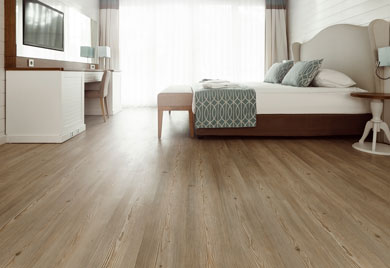Are you looking for a stylish and durable flooring option for your home? Luxury vinyl plank (LVP) flooring has become incredibly popular in recent years, offering a realistic wood look with the practicality of vinyl. However, as with any flooring choice, there are advantages and disadvantages to consider. This comprehensive guide will explore the pros and cons of LVP, helping you decide if it’s the right fit for your needs and lifestyle.

Image: plumbandlined.com
LVP is a type of resilient flooring that mimics the appearance of real hardwood, stone, or tile. It’s made of multiple layers, including a wear layer for durability, a core layer for stability, and a printed vinyl image layer that creates the desired aesthetic. LVP is available in a wide range of colors, styles, and textures, making it a versatile choice for various interior design schemes. Its popularity stems from its affordability, durability, ease of maintenance, and water resistance, making it a practical and appealing option for many homeowners.
Pros of Luxury Vinyl Plank Flooring
Durability and Resistance
Luxury vinyl plank flooring is known for its exceptional durability. The wear layer, often made of a protective coating like polyurethane or aluminum oxide, guards against scratches, dents, and abrasions. This makes LVP a great choice for high-traffic areas like kitchens, hallways, and living rooms. Furthermore, LVP is highly resistant to moisture and water damage, making it suitable for bathrooms, basements, and even outdoor spaces.
Aesthetic Appeal
LVP has come a long way in terms of its aesthetic appeal. Modern manufacturing techniques allow for realistic wood grain patterns and textures, creating a convincingly natural look. With a vast selection of colors, styles, and even simulated wood knots and imperfections, LVP can match the style of any home, from modern and minimalist to rustic and traditional.

Image: www.waterandnature.org
Easy Installation and Maintenance
LVP is relatively easy to install, making it a DIY-friendly option for many homeowners. It typically comes in click-lock planks that simply snap together, requiring minimal tools and expertise. The floating installation method also allows for easy replacement of individual planks if needed. Similarly, LVP is incredibly easy to maintain. Regular sweeping or vacuuming is usually sufficient to keep the floor clean, and spills can be wiped away with a damp mop.
Affordability and Value
LVP is often considered a more affordable option compared to real hardwood flooring. It can offer a similar aesthetic at a lower price point, making it a budget-friendly choice for many homeowners. Moreover, LVP’s durability and low maintenance requirements contribute to its long-term value, making it a worthwhile investment.
Cons of Luxury Vinyl Plank Flooring
Limited Durability
While LVP is quite durable, it can still be susceptible to certain types of damage. Heavy objects or sharp impacts can potentially leave dents or scratches, especially on thinner planks. Additionally, some LVP flooring might lack the scratch resistance of engineered hardwood, making it less ideal for homes with pets or a lot of foot traffic.
Potential for Fading
Unlike real wood, which can be refinished, LVP’s wear layer is the determining factor for its durability. If the wear layer is damaged, the flooring cannot be refinished and will need to be replaced. This factor should be considered in high-traffic areas where wear and tear are more likely to occur. Similarly, LVP might fade in direct sunlight, particularly over prolonged periods. Some LVP products are designed to withstand UV rays, but it’s essential to check the specifications before installation.
Potential for Uneven Expansion
While LVP is known for its stability, there is a possibility of uneven expansion in extreme temperatures, especially when exposed to moisture. This can lead to slight gaps or buckling in the flooring. To minimize this risk, proper installation and acclimation of the planks before installation are crucial. It’s best to consult an experienced flooring installer for professional advice.
Not as Eco-Friendly as Natural Materials
LVP flooring is made from synthetic materials, which, although recyclable, do not decompose as easily as natural materials. While some LVP manufacturers are aiming for more sustainable production practices, it’s important to research the sourcing and manufacturing processes of the specific LVP product you are considering.
Should You Choose Luxury Vinyl Plank Flooring?
Deciding whether LVP is the right choice for your home depends on your individual needs and priorities. If you’re looking for a durable, water-resistant flooring with a realistic wood look and ease of maintenance, LVP is a great option. However, if you prioritize a fully natural and refinishable flooring or longevity without any wear layer limitations, real hardwood might be a better fit.
Ultimately, the best way to determine if LVP is right for you is to weigh the pros and cons carefully.
Pros And Cons Of Luxury Vinyl Plank Flooring
Conclusion
Luxury vinyl plank flooring offers a compelling combination of affordability, durability, and style. Its water resistance, ease of installation and maintenance, and vast array of aesthetic options make it a popular choice for homeowners who prioritize practicality without sacrificing visual appeal. However, it’s important to consider its potential drawbacks, such as limited durability, possible fading, and environmental considerations. By carefully considering the pros and cons of LVP, you can make an informed decision and choose the flooring that best meets your needs and preferences.
If you’re still unsure about LVP or want to explore other flooring options, consulting with a flooring specialist can provide valuable insights and personalized recommendations.





